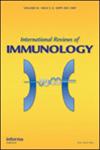了解辐射合并烧伤时的先天反应和适应性反应。
IF 2.9
4区 医学
Q2 IMMUNOLOGY
引用次数: 0
摘要
辐射复合烧伤(RCBI)事件的发生对公众健康构成了重大风险。了解与此类损伤相关的免疫和生理反应,对于制定护理分流方案以应对因辐射和烧伤的协同效应而造成的死亡至关重要。本综述的核心重点在于揭示针对 RCBI 的免疫反应。朗格汉斯细胞、肥大细胞、角质形成细胞和成纤维细胞可诱导先天性免疫,我们已对它们对辐射、烧伤和综合损伤的反应进行了研究。在适应性免疫反应方面,探讨了 T 调节(Treg)细胞、T 辅助细胞(Th1、Th2 和 Th17)和免疫球蛋白的行为变化,结果发现与烧伤和辐射损伤相比,愈合延迟。综述还包括补体系统成分的功能,如中性粒细胞、急性期蛋白(CRP、C3 和 C5)以及细胞因子在 RCBI 中的作用。由于辐射剂量、烧伤类型及其固有的辐射敏感性不同,导致免疫细胞数量减少的综合损伤会产生不同的反应。缺乏已获批准的 RCBI 对策是一项重大挑战。药物再利用可能有助于平衡免疫细胞的改变,从而快速康复并降低死亡率,这对此类疾病的发病部位具有重要的临床意义。然而,在临床前和临床阶段,RCBI 的确切免疫反应仍未得到充分探索,这可能是由于没有体外模型、标准动物模型或人体受试者,因此需要进一步研究。本文章由计算机程序翻译,如有差异,请以英文原文为准。
Understanding innate and adaptive responses during radiation combined burn injuries.
The occurrence of incidents involving radiation-combined burn injuries (RCBI) poses a significant risk to public health. Understanding the immunological and physiological responses associated with such injuries is crucial for developing care triage to counter the mortality that occurs due to the synergistic effects of radiation and burn injuries. The core focus of this narrative review lies in unraveling the immune response against RCBI. Langerhans cells, mast cells, keratinocytes, and fibroblasts, which induce innate immunity, have been explored for their response to radiation, burns, and combined injuries. In the case of adaptive immune response, exploring behavioral changes in T regulatory (Treg) cells, T helper cells (Th1, Th2, and Th17), and immunoglobulin results in delayed healing compared to burn and radiation injury. The review also includes the function of complement system components such as neutrophils, acute phase proteins (CRP, C3, and C5), and cytokines for their role in RCBI. Combined insults resulting in a reduction in the cell population of immune cells display variation in response based on radiation doses, burn injury types, and their intrinsic radiosensitivity. The lack of approved countermeasures against RCBI poses a significant challenge. Drug repurposing might help to balance immune cell alteration, resulting in fast recovery and decreasing mortality, which gives it clinical significance for its implication on the site of such incidence. However, the exact immune response in RCBI remains insufficiently explored in pre-clinical and clinical stages, which might be due to the non-availability of in vitro models, standard animal models, or human subjects, warranting further research.
求助全文
通过发布文献求助,成功后即可免费获取论文全文。
去求助
来源期刊
CiteScore
11.00
自引率
4.00%
发文量
24
期刊介绍:
This review journal provides the most current information on basic and translational research in immunology and related fields. In addition to invited reviews, the journal accepts for publication articles and editorials on relevant topics proposed by contributors. Each issue of International Reviews of Immunology contains both solicited and unsolicited review articles, editorials, and ''In-this-Issue'' highlights. The journal also hosts reviews that position the authors'' original work relative to advances in a given field, bridging the gap between annual reviews and the original research articles.
This review series is relevant to all immunologists, molecular biologists, microbiologists, translational scientists, industry researchers, and physicians who work in basic and clinical immunology, inflammatory and allergic diseases, vaccines, and additional topics relevant to medical research and drug development that connect immunology to disciplines such as oncology, cardiovascular disease, and metabolic disorders.
Covered in International Reviews of Immunology: Basic and developmental immunology (innate and adaptive immunity; inflammation; and tumor and microbial immunology); Clinical research (mechanisms of disease in man pertaining to infectious diseases, autoimmunity, allergy, oncology / immunology); and Translational research (relevant to biomarkers, diagnostics, vaccines, and drug development).

 求助内容:
求助内容: 应助结果提醒方式:
应助结果提醒方式:


